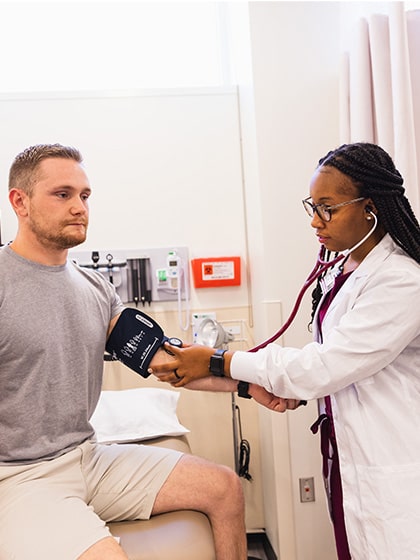Pre-Physician Assistant Track

Physician assistants (PAs) operate under the supervision of a physician, but they often serve as the primary care providers in rural or inner-city clinics where a physician may only be available a few days each week. In these situations, the PA consults with the supervising physician and other medical professionals as needed or mandated by law. PAs may also make house calls or visit hospitals and nursing homes to check on patients and relay information back to the physician. In our community, PAs are active in local hospitals and emergency rooms.
PAs are capable of performing many of the same tasks as physicians, though their scope of practice is governed by state laws. Currently, there are over 300 accredited or provisionally accredited educational programs for physician assistants, with over 90 offering a master's degree. The remaining programs provide either a bachelor's degree or an associate degree.
It’s important to research the scope of practice for PAs and how it compares to that of nurse practitioners (NPs), as schools often inquire about this during the interview process.
PA Schools in Alabama
There are four PA schools in Alabama:
- Faulkner University (pending accreditation), Montgomery, AL
- Samford University, Birmingham, AL
- University of Alabama-Birmingham, Birmingham, AL
- University of South Alabama, Mobile, AL
Admissions Requirements
Admissions requirements can differ between schools, but one constant is that gaining entry to a PA program is highly competitive. It is advisable to check the specific school's website (see the link to the right) for details on the prerequisite coursework needed. Generally, the coursework is as rigorous as that of a pre-medicine curriculum, but the specific content may vary significantly. For instance, some PA programs require organic chemistry, while others do not.
Coursework
The majority of PA programs have the following prerequisites:
- Majors Biology (8 semester hours)
- General Chemistry (8 semester hours)
- Microbiology (4 semester hours)
- Human Anatomy & Physiology (8 semester hours)
- Statistics (3 semester hours)
- Medical Terminology (1-3 hours; school-specific)
- Psychology (General and/or Abnormal and/or Developmental; school-specific)
Healthcare Experience (Hands-on Patient Care)
Many PA schools have specific requirements regarding the number of hands-on patient care hours necessary. Some schools require hundreds of hours whereas the more competitive schools require thousands of hours of hands-on patient care. Use this handy guide (click here) to find just what each school requires for admission to their school.
Graduate Record Examination (GRE)
You must score well on the GRE in order to be admitted to a PA program. Each school has specific criteria on the three portions of the GRE, so consult each school's website for more information.
Grade Point Average (GPA)
Having a high GPA overall and in your science and math classes is crucial to being admitted to PA school. Each school has specific criteria for GPA, so consult each school's website for more information.